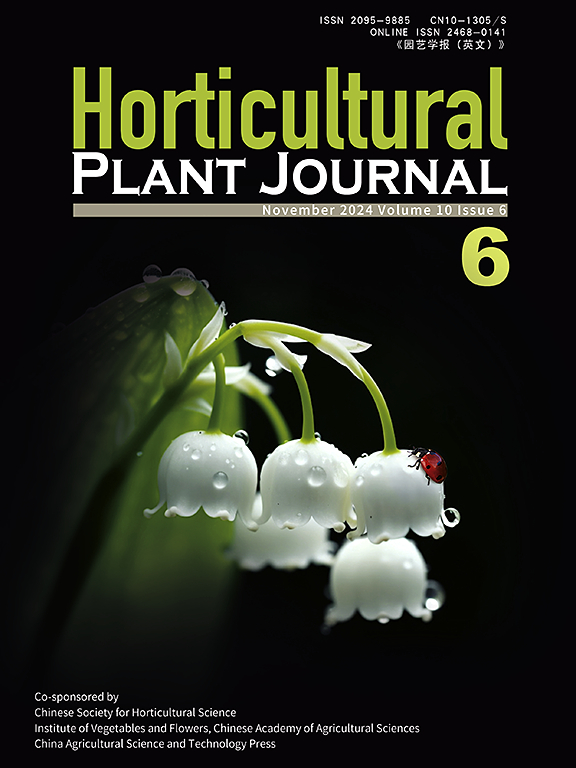MdWRKY71 是参与 5-aminolevulinic acid 诱导的苹果耐盐性的正调控因子
IF 5.7
1区 农林科学
Q1 HORTICULTURE
引用次数: 0
摘要
5-氨基乙酰丙酸(ALA)是一种新型植物生长调节剂,可增强植物对盐胁迫的耐受性。然而,对 ALA 的分子机理还没有深入研究。本研究以苹果(Malus × domestica 'Gala')的离体叶片或培养的胼胝体为材料,发现 ALA 能提高苹果(Malus × domestica 'Gala')的耐盐性。研究发现,WRKY 转录因子(TF)基因 MdWRKY71 的表达对 NaCl 和 ALA 处理均有反应。功能分析显示,过表达 (OE)-MdWRKY71 能显著提高转基因苹果的耐盐性,而 RNA 干扰 (RNAi)-MdWRKY71 则会降低耐盐性。然而,外源 ALA 可减轻 RNAi-MdWRKY71 苹果的盐害。将 MdWRKY71 转入烟草后,转基因植株的耐盐性增强,外源 ALA 进一步提高了耐盐性。随后,MdWRKY71 与 MdSOS2、MdNHX1、MdCLC-g、MdSOD1、MdCAT1 和 MdAPX1 启动子的 W-box 结合,转录激活了这些基因的表达。由于这些基因分别负责Na+和Cl-的转运以及抗氧化酶的活性,因此可以得出结论:MdWRKY71作为一种新的TF,通过调节离子平衡和氧化还原平衡参与了ALA提高耐盐性的过程。这些结果为研究 ALA 提高苹果耐盐性的转录调控机制提供了新的视角。本文章由计算机程序翻译,如有差异,请以英文原文为准。
MdWRKY71 as a positive regulator involved in 5-aminolevulinic acid-induced salt tolerance in apple
5-Aminolevulinic acid (ALA), is a novel plant growth regulator that can enhance plant tolerance against salt stress. However, the molecular mechanism of ALA is not well studied. In this study, ALA improved salt tolerance of apple (Malus × domestica 'Gala') when the detached leaves or cultured calli were used as the materials. The expression of MdWRKY71 , a WRKY transcription factor (TF) gene was found to be responsive to NaCl as well as ALA treatment. Functional analysis showed that overexpressing (OE)-MdWRKY71 significantly improved the salt tolerance of the transgenic apple, while RNA interfering (RNAi)-MdWRKY71 reduced the salt tolerance. However, exogenous ALA alleviated the salt damage in the RNAi-MdWRKY71 apple. When MdWRKY71 was transferred into tobacco, the salt tolerance of transgenic plants was enhanced, which was further improved by exogenous ALA. Subsequently, MdWRKY71 bound to the W-box of promoters of MdSOS2, MdNHX1, MdCLC-g, MdSOD1, MdCAT1 and MdAPX1 , transcriptionally activating the gene expressions. Since the genes are responsible for Na+ and Cl− transport and antioxidant enzyme activity respectively, it can be concluded that MdWRKY71, a new TF, is involved in ALA-improved salt tolerance by regulating ion homeostasis and redox homeostasis. These results provided new insights into the transcriptional regulatory mechanism of ALA in enhancing apple salt tolerance.
求助全文
通过发布文献求助,成功后即可免费获取论文全文。
去求助
来源期刊

Horticultural Plant Journal
Environmental Science-Ecology
CiteScore
9.60
自引率
14.00%
发文量
293
审稿时长
33 weeks
期刊介绍:
Horticultural Plant Journal (HPJ) is an OPEN ACCESS international journal. HPJ publishes research related to all horticultural plants, including fruits, vegetables, ornamental plants, tea plants, and medicinal plants, etc. The journal covers all aspects of horticultural crop sciences, including germplasm resources, genetics and breeding, tillage and cultivation, physiology and biochemistry, ecology, genomics, biotechnology, plant protection, postharvest processing, etc. Article types include Original research papers, Reviews, and Short communications.
 求助内容:
求助内容: 应助结果提醒方式:
应助结果提醒方式:


